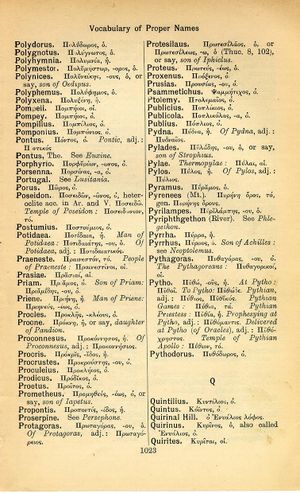Procrustes: Difference between revisions
From LSJ
Μακάριος, ὅστις οὐσίαν καὶ νοῦν ἔχει → Felix, qui mentem cum divitiis possidet → Glückselig, wer Vermögen und Vernunft besitzt
(D_7) |
(Gf-D_7) |
||
| Line 1: | Line 1: | ||
{{WoodhouseENELnames | {{WoodhouseENELnames | ||
|Text=[[File:woodhouse_1023.jpg|thumb|link= | |Text=[[File:woodhouse_1023.jpg|thumb | ||
|link={{filepath:woodhouse_1023.jpg}}]]Προκρούστης, -ου, ὁ. | |||
}} | }} | ||
{{Lewis | {{Lewis | ||
Revision as of 07:36, 14 August 2017
English > Greek (Woodhouse)
Προκρούστης, -ου, ὁ.
Latin > English (Lewis & Short)
Prŏcrustes: ae, m., = Προκρούστης,
I a noted highwayman in Attica. He had a bed upon which he compelled travellers to lie down; when they were longer than the bed he cut off as much of their limbs as would suffice to make the length equal; and when they were shorter he stretched them out to its length. He was slain by Theseus: vidit et immitem Cephisias ora Procrusten, Ov. M. 7, 438: torvus, id. H. 2, 69; Sen. Clem. 2, 4, 1; cf. Hyg. Fab. 38.
Latin > French (Gaffiot 2016)
Prŏcrustēs,¹⁴ æ, m. (Προκρούστης), Procruste ou Procuste, brigand de l’Attique, tué par Thésée : Ov. M. 7, 438 ; Sen. Clem. 2, 4, 1.

